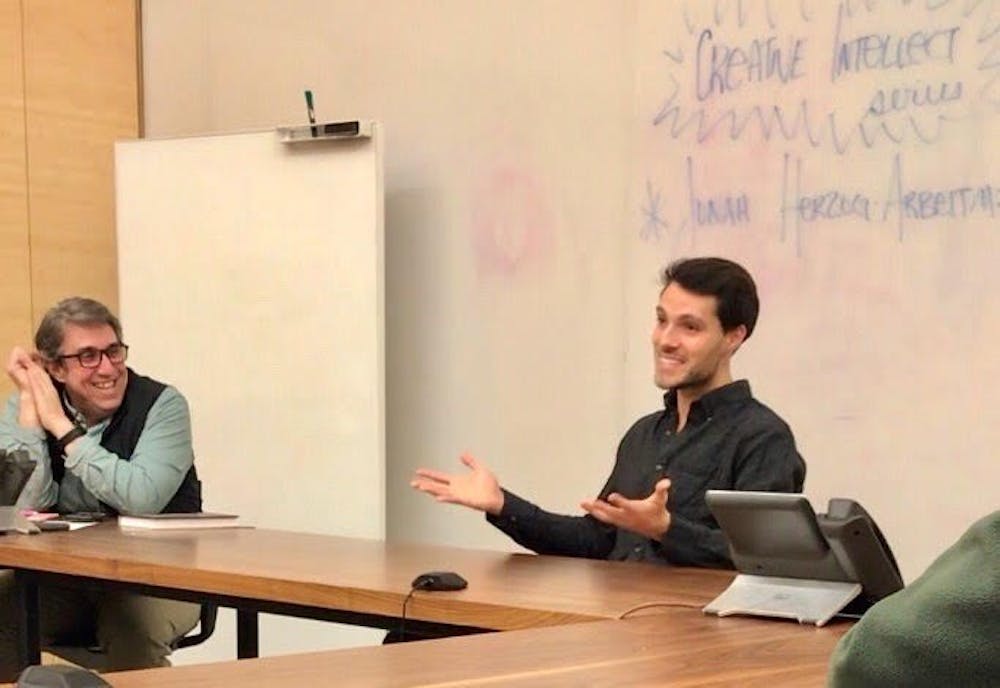Jonah Herzog-Arbeitman ’19 very possibly won his Marshall Scholarship because his reviewers liked the fact that he can perform skits about the cosmos.
On campus, Herzog-Arbeitman is known for his study of physics and his involvement in the improv comedy troupe Quipfire!. This year, he also threw poetry into his mix of passions, working on a creative thesis with professor Michael Dickman.
On Thursday, along with associate professor of theater Brian Herrera, Herzog-Arbeitman gave a talk about his research passions as part of the Creative Intellect Series, sponsored by the Lewis Center for the Arts. He led his audience in a series of four interactive exercises: an improv skit in which he explained his thesis, a poetry reading, and two wordplay games.
“Creativity is part of every intellectual practice. Every creative practice has an intellectual dimension,” Herrera said on Thursday.
Each Creative Intellect Series talk serves as what Herrera called a “public facing work-demo,” the culminating exercise of a student’s independent work with him.
Herzog-Arbeitman’s independent work with Herrera began last spring, after the first creative intellect conversation, which was with Tessa Albertson ’20.
“He approached me,” Herrera recalled, “and said, ‘I’m trying to bridge my work in physics with my work in comedy and my work in poetry — and I haven’t found a space on campus. Could we do something together?”
Together, Herrera and Herzog-Arbeitman selected books drawing from four particular fields: the history of comedy, the theories of comedy, tactics of popular science, and performance study and theory. Herzog-Arbeitman completed those readings during his spare time while studying physics in Germany — he and Herrera then turned their attention to the interplay between physics and performance studies.
Then, midway through the fall semester, Herzog-Arbeitman started receiving invitations to participate as a finalist in what Herrera laughingly called “fancy British scholarships.”
He discovered that the bridge between physics and improv greatly interested his interviewers.
Herzog-Arbeitman had largely prepared answers for deep physics questions in anticipation of his fellowship interviews.
But instead, he said, “I was asked all these oddball questions. Can you explain dark matter to my 5-year-old? Can you give us a skit about dark matter? Can you give us a skit about Brexit?”

When he left the interviews, he and Herrera began to hone in on more on the link between physics and improv.
“There’s a moment and feeling that accompanies a discovery in theoretical work,” Herzog-Arbeitman said. “Improv gives you a template to replicate that feeling when everything clicks.”
Herzog-Arbeitman and Herrera also began to incorporate a third creative register into their discussions: poetry.
Those three disciplines — physics, improv, and poetry — might not seem to naturally go together. But for Herzog-Arbeitman, their connection is evident.
“I’m always looking for things that are smarter than me,” he explained. “I’m looking to give very little and get back a lot. To write down a simple equation and have it give me a lot. To write a very brief poem — you can earn a lot in just a couplet. On stage, in two minutes, you can have a room brought together.”
Herzog-Arbeitman’s trio of passions won him a Marshall Scholarship, and he sees them continuing after the end of his undergraduate career.
Next year, he will attend Oxford University, where he will pursue an Master of Science in theoretical and mathematical physics, audition for the Oxford Imps, and write poetry. The following year, he will move to the University of Nottingham for an Master of Philosophy.
But the focus of his Creative Intellect talk was by no means his scholarship — it was the passion for interdisciplinary study that he and Herrera share.
“These disciplines are in service of each other,” Herrera said. “As the University puts more and more focus on interdisciplinary education, the idea of a space for creative intellect becomes more and more important.”
The students in the room felt the same.
“Hearing Jonah’s talk was really inspiring,” Wendi Yan ’22 said. “I identify myself as a visual artist who seeks to communicate academic topics through visceral experiences to a public audience, and Jonah’s talk inspired me. He left me wondering how I can unify the topics, imageries, and disciplines I am interested in.”
The talk took place at 4:30 p.m. in the Wallace Dance Building on Thursday, Dec. 13.








